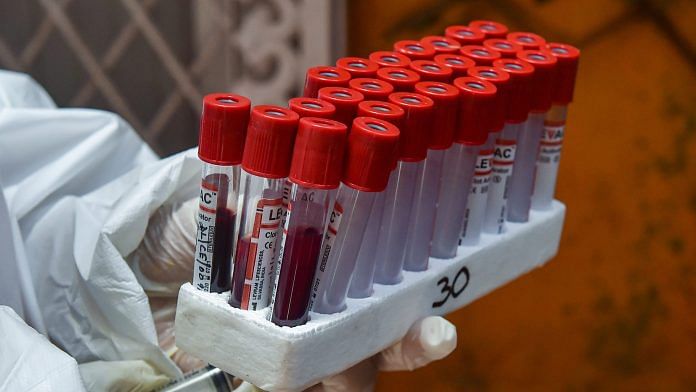New Delhi: The global death toll from the novel coronavirus continues to rise, with scientists around the world publishing new research every day to better understand the impact of the SARS-CoV-2 virus.
Here are some of the latest research studies on Covid-19.
HIV, TB, malaria deaths may increase due do Covid-19
Deaths from HIV, tuberculosis (TB), and malaria could increase by as much as 10 per cent, 20 per cent, and 36 per cent respectively over the next five years in some low- and middle-income countries due to disruption in health services caused by the Covid-19 pandemic, according to a new modelling research published in The Lancet Global Health.
The coronavirus pandemic has the potential to cause substantial disruptions by overwhelming already fragile health systems, limiting routine health-related programmes, and interrupting medical supply chains.
Ensuring that the core management and prevention services for HIV, TB, and malaria are maintained could largely mitigate broader health impact of the pandemic, researchers have said.
The researchers also cautioned that predicting the true impact of the ongoing pandemic and its response on other diseases is fraught with difficulty, especially when so much remains unknown about the virus and the extent to which other disease programmes may be disrupted, and how this might impact the health of populations.
Also read: India’s R value for Covid-19 drops back to 1.11, after three-month high last week
Gene behind potent antibody response against virus identified
Scientists have uncovered a gene frequently used in antibodies that most effectively target the virus by analysing 294 recently-identified human SARS-CoV-2 antibodies.
The study looks at hundreds of antibodies that target the spike protein of SARS-CoV-2 which helps the virus infect human cells by latching on to the ACE2 receptor.
Scientists have identified a gene, known as IGHV3-53, which is frequently-used for targeting the spike protein of the virus. IGHV3-53 antibodies not only have lower mutation rates but are also more potent, according to the researchers.
The team also studied the crystal structure of two IGHV3-53 antibodies bound to the spike protein and identified the features that make them so effective at binding and highly potent.
A detailed insight into IGHV-53 neutralising antibodies should facilitate the design of vaccine antigens that elicit a similar type of response against the virus, the team said.
Covid-19 patients more likely to develop psychiatric disorders
People who have or had Covid-19 symptoms are more likely to be lonelier and develop psychiatric disorders, with women and young people more at risk, a study has suggested.
Although there has been previous research on specific coronavirus-related disorders such as anxiety, depression and insomnia, little is known about the broader psychological impact of the pandemic on a wider population.
The study measured general psychiatric disorders and loneliness based on standardised and widely-accepted questionnaires, which looks at factors ranging from depressive anxiety symptoms to confidence and overall happiness.
Analysis of the results showed that those who have or had coronavirus symptoms were more likely to have psychiatric disorders.
Women and people under 30 years were significantly more at risk from general psychiatric disorders and loneliness. The researchers said that it may reflect how younger people’s social and economic lives have been more disrupted by the public health crisis.
Tocilizumab can cut death risk in critically-ill Covid-19 patients
A single dose of Tocilizumab can reduce death risks among critically-ill Covid-19 patients by 45 per cent, a study has suggested.
Patients are more likely to be out of the hospital or off a ventilator one month after treatment with the drug, that calms an overreacting immune system, compared to those who don’t receive it, the study has found.
The risk of death has also been found to be lower in patients who were twice as likely to develop an additional infection along with Covid-19.
The study, published in the journal Clinical Infectious Diseases, looked at data from 154 critically-ill patients from early March to late April in the US. The analysis looked at patients’ records through late May.
Tocilizumab, originally designed for rheumatoid arthritis, has already been used to calm “cytokine storm” caused by the immune system’s overreaction in patients receiving advanced immunotherapy treatment for cancer.
Modified llama antibodies can neutralise coronavirus
Scientists have found that antibodies derived from llamas can neutralise the SARS-CoV-2 virus in lab tests.
The antibodies — known as nanobodies due to their small size — could eventually be developed as a treatment for patients with severe Covid-19, the researchers have said.
Llamas naturally produce quantities of small antibodies with a simpler structure that can be turned into nanobodies. The researchers have engineered new nanobodies using a collection of antibodies taken from blood cells of llamas.
In the study, published in Nature Structural & Molecular Biology, the team has shown that nanobodies bind tightly to the spike protein of SARS-CoV-2 virus, blocking it from entering human cells and stopping infection.
These nanobodies have the potential to be used in a similar way to convalescent serum, effectively stopping progression of the virus in patients who are ill, the team has said.
Also read: Low-cost hepatitis C drugs reduce death rate in Covid-19 patients, researchers claim



